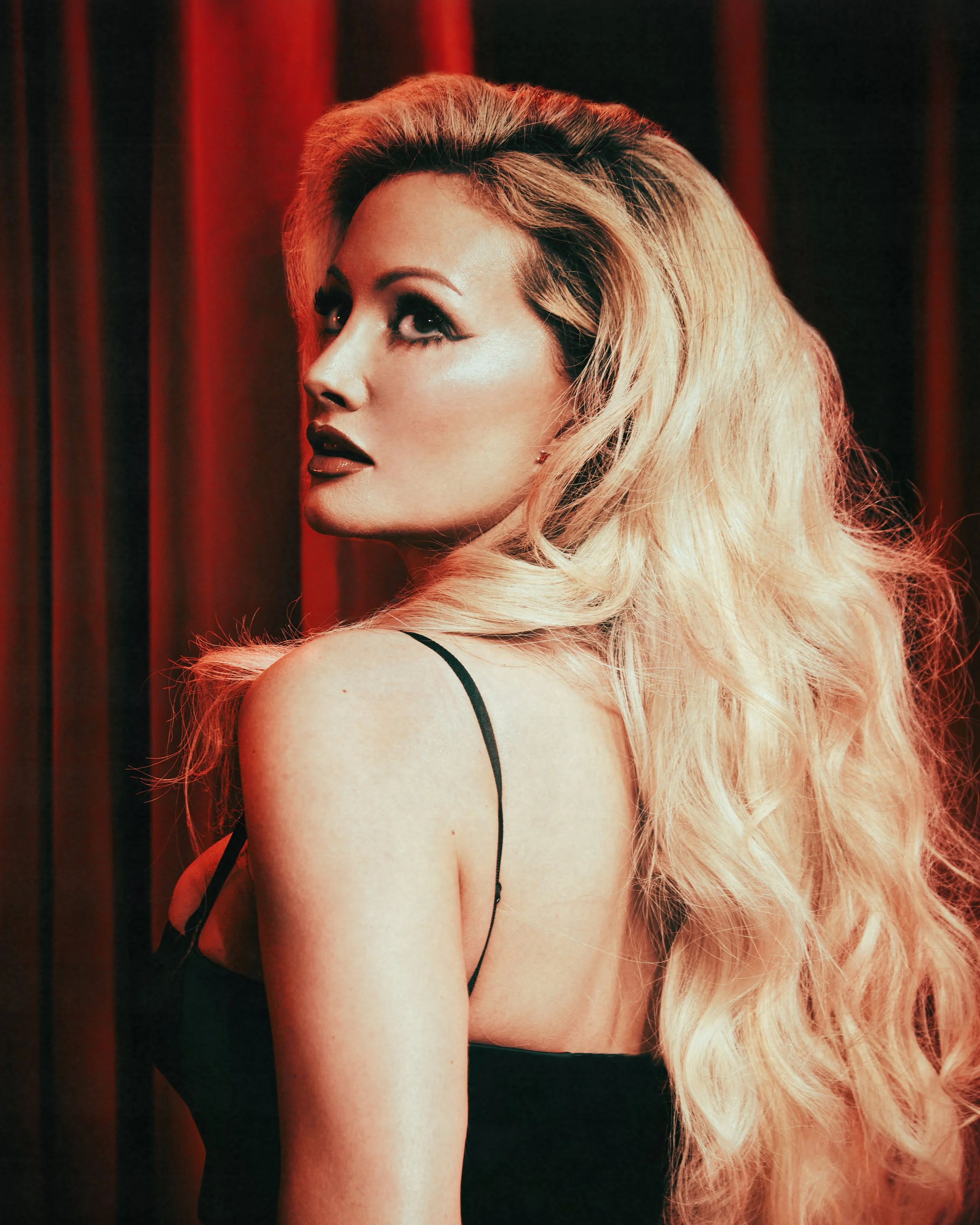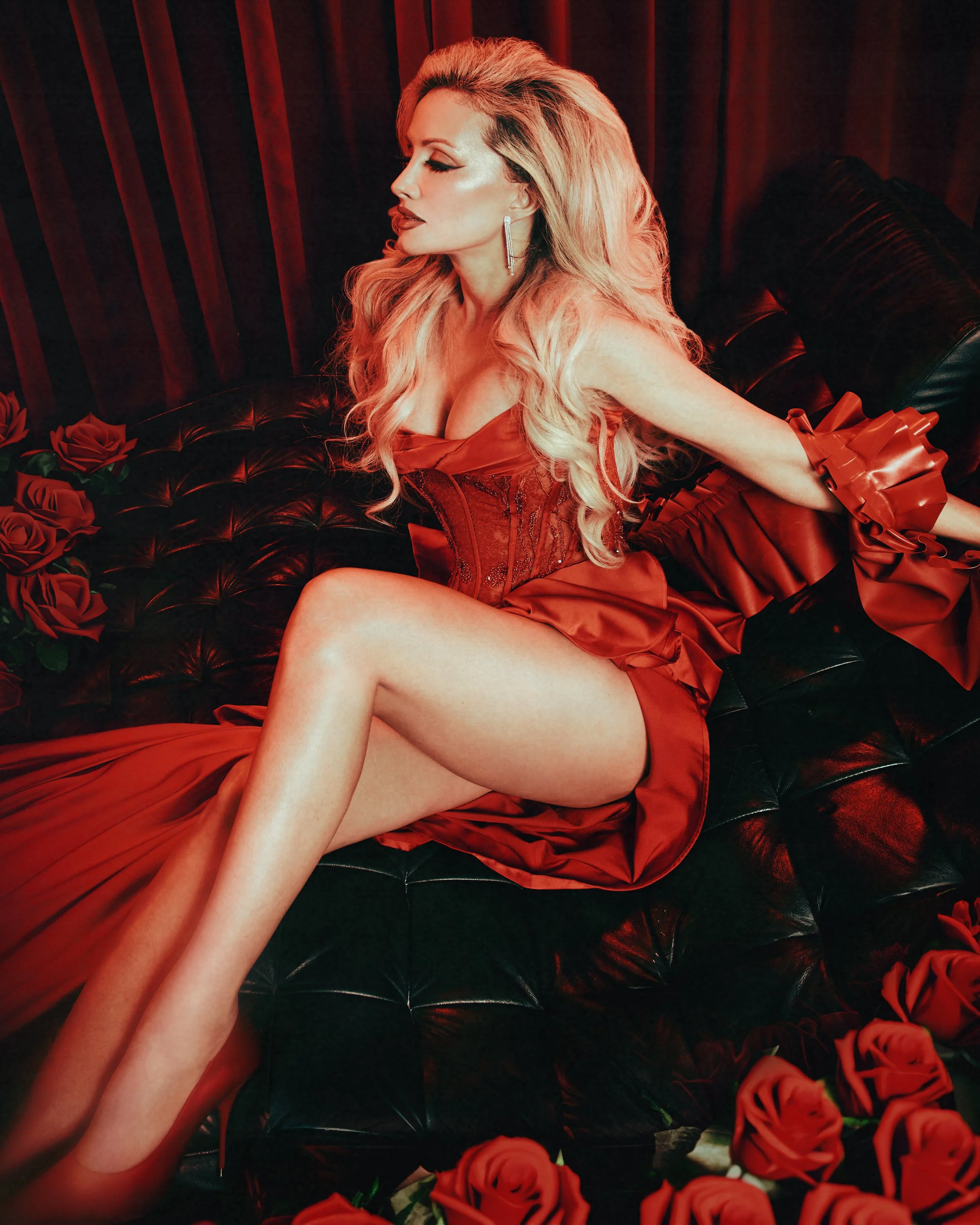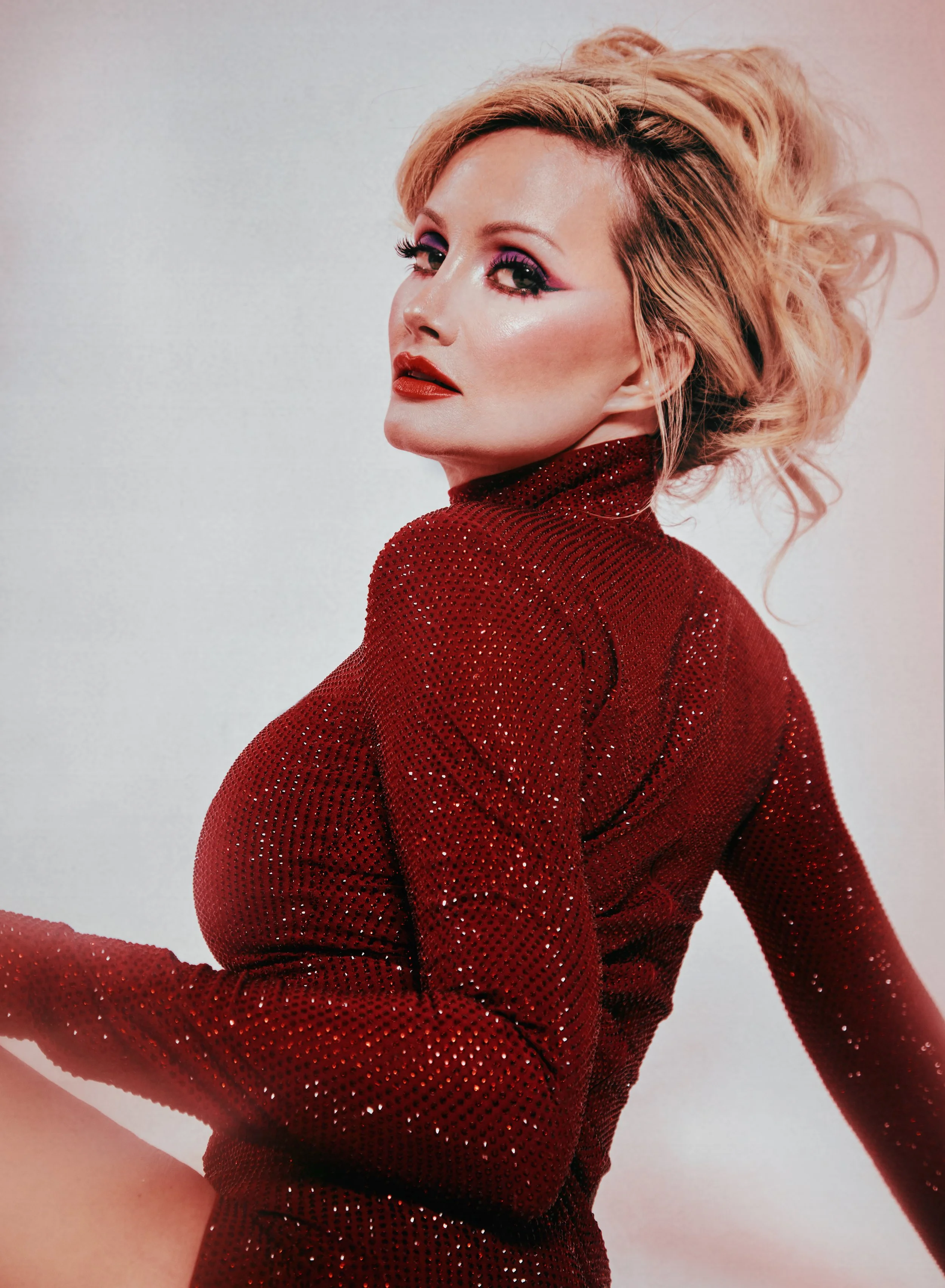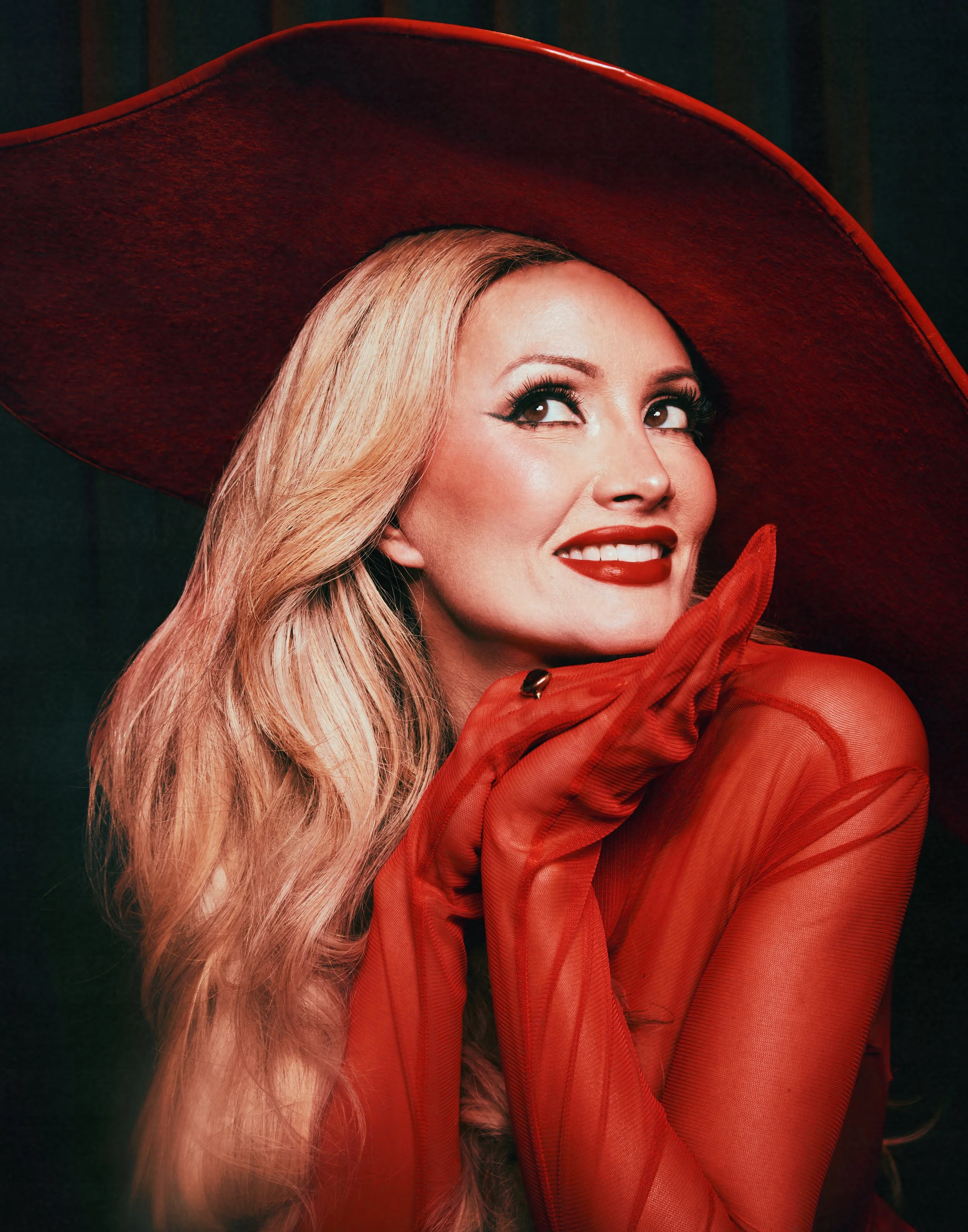Holly Madison on Y2K Celebrity, True Crime and Demystifying Sex Work
Words: Lauren O’Neill
Make it stand out
Holly Madison is what you could reasonably call television royalty. While these days she is best known for her presenting work, fame initially came to her under different circumstances. Between 2005 and 2009, Madison – at the time a Playboy Playmate, and a girlfriend of the Playboy’s founder Hugh Hefner – starred on a show called The Girls Next Door, which arrived on the E! network in the US at around the same time The Osbournes was going gangbusters for MTV.
Madison, however, was not an actor. Just as The Osbournes followed the exploits of Ozzy, Sharon, Jack and Kelly, The Girls Next Door simply shadowed her as she went about her life, along with her fellow Playmates Kendra Wilkinson and Bridget Marquardt. As they travelled the world, attending rhinestone-encrusted Playboy parties and triple-handedly raising the market value of Juicy Couture, these women were also forging a path that would come to change culture as everyone understood it. They were becoming three of the first ever reality TV stars.
Now 44, Madison, who moved into the Playboy Mansion as a college student “barely making rent”, has had some time to think about this period of her life. When we speak on the phone – I am in London, Madison is in LA, up early having made eggs for breakfast – she explains her nuanced feelings about her part in the emergence of a generation-defining art form.
“I really feel like [The Girls Next Door] was a show about a lifestyle,” she tells me. “It wasn't so much designed to be about us at first, but of course, it became about us once people got to know us. I don't think you could do a show like that today, because social media really gives you access to other people's unusual lifestyles. But back then we didn't have any of that – MySpace was just starting. So to do a show about a lifestyle that people were intrigued by was really effective. I kind of think of the Playboy Mansion as the original content house.”
Jewellery: Mondo Mondo | Top: Karolina’s Kingdom
Though Madison has her complaints regarding the way she and her co-stars were treated and portrayed, she continues, “I do feel lucky that we were involved in the show,” and she’s especially grateful that she got into the reality TV game early. “It wasn't as heavily dramatic as it could have gotten – the way the Housewives shows are today. Some people make it into an amazing career. But it just seems like a lot of people kind of get their lives ruined – their deepest secrets come out and they end up in jail or their marriages fall apart.”
While there is probably no better candidate for a bombshell addition to one of Bravo’s many casts, however, Madison has firmly moved on from reality TV (though she and Marquardt do still regularly discuss The Girls Next Door on their podcast Girls Next Level). Now, she is committed to her documentary work, fronting the programmes The Playboy Murders and, as of March, Lethally Blonde on the Discovery Channel.
Both series attempt to shed light on violent crimes against sex workers. The former focuses specifically on Playboy-related incidents, while Lethally Blonde zooms out to look at the sex industry in Hollywood as a whole, taking in subject matter like gay porn and OnlyFans. But when The Playboy Murders was brought to her attention in 2023, Madison was reluctant to get involved – it was only when she began to understand the show’s ethos of telling the stories of people who are victimised because of the industries they work in, that she changed her mind.
Dress: Jasmine Erbas | Stole: Vex Latex | Heels: Jeffrey Campbell | Earrings: Sterling Forever
“I felt like I was too up to my ears in Playboy stuff,” Madison says now. “But I saw that so many of the cases the production company wanted to cover, I had never heard of, even as somebody who thought she knew everything about Playboy. We've always had a mission to tell the stories from a victim-centric perspective and really try to get to know the players in these stories as more than just one dimensional sex symbols or whatever people might think these people are,” she tells me. “So it's been a really rewarding experience.”
As a consumer of true crime content herself, Madison approached production with clarity on what she didn’t want to do. “I would see interviews included in the projects that were a little bit victim blaming,” she says, adding that her shows “try never to focus on the stories from a judgmental perspective.”
“I think once people know how these industries work a little bit better, they can have more empathy for the people involved. For so many years, nobody would talk about sex work, and it just wasn't included in the mainstream narrative.”
She hopes that discussing the cases in this manner can change minds about sex work, even just through informing viewers more effectively about the industry. “I think once people know how these industries work a little bit better, they can have more empathy for the people involved,” Madison explains. “For so many years, nobody would talk about sex work, and it just wasn't included in the mainstream narrative.”
Dress: SOLANGEL
Indeed, The Girls Next Door itself is a useful illustration of the way that culture viewed the sex industry – that is, as a bawdy curiosity, rather than something that many of us actively engage with in one way or another – for a long time (and in a lot of cases, still does). The way that the show stereotyped Madison and the other Playmates, as jealous, scheming or stupid, sometimes took hold in real life, and affected her relationships within the Playboy Mansion.
“There was drama, and there was fake drama that turned into real drama,” she says of her time on The Girls Next Door. “I know there's a lot of women who did have positive experiences but I don't look back on my time that fondly. I certainly feel like I made lemonade out of lemons, but it was rough living there. I got in way over my head and there was just so much competition and so much emotional abuse in that relationship I was in,” she explains.
Hat: Cecilio Castrillo | Top: Tako Mekvabidze | Ring: Mondo Mondo
Rewatching the show now for the Girls Next Level podcast, however, has helped Madison to reclaim that era of her life, alongside Marquardt. She says she’s especially tickled to see the Y2K fashion she helped to pioneer coming back into style. “Every once in a while an episode will come up and I'm like, ‘What the fuck was I wearing?’” she laughs. “There was this thing in the early 2000s where people would layer so many things that had absolutely no business being layered. And there's twice I can think of so far on the podcast that I've seen outfits of mine and I'm like, ‘Wait, why am I wearing a buttoned-up shirt with a corset over it, with jeans?’ It makes zero sense!”
Indeed, whether it’s our hard-won knowledge that, contrary to what we thought in the 2000s, we don’t have to wear all of our clothes at once (plus our merciful eschewing of the baker boy hat as an accessory of choice), or the slow, still-incomplete development of a societal understanding and acceptance of sex work, Holly Madison has been up close and personal with the ways in which our world has changed, regressed, and expanded for almost two decades. These front row tickets have given her a unique perspective, and, ultimately, they’ve also galvanised her to keep pushing forward, particularly when it comes to sharing the unheard stories of so many in the sex industry.
Dress and Belt: Namilia
Jacket: Helen Anthony | Shoes: Jeffrey Campbell | Mesh Top: Tako Mekvabidze
“As a 44 year old woman, I've seen culture evolve,” Madison says. “And sometimes, just when you think you're in the clear, and people's minds have changed and evolved, you're hit with some example that shows you they haven’t all the way.” This is why, she concludes, it’s so crucial to keep talking. “It’s still so important to tell these stories, and get a better understanding of who these human beings really are. I hope people watch these shows and come away with an understanding of how those people aren't too different from people who aren't in those industries. I’d just like to open people's minds a little bit to that.”
Photography: Savanna Ruedy | Styling: Malcolm Smith | Set Design: Dripdome | Makeup: Ash Simmons | Hair: Luca Burnett | Photography Assistants: Eliza Jouin & Kirt Barnett | Creative Direction: Ione Gamble








